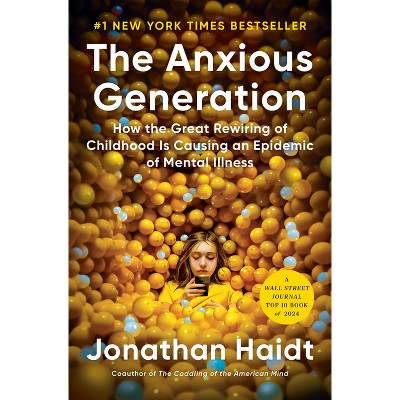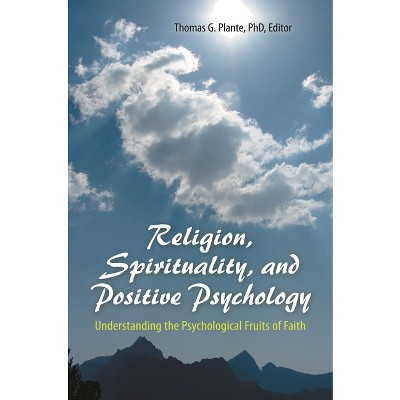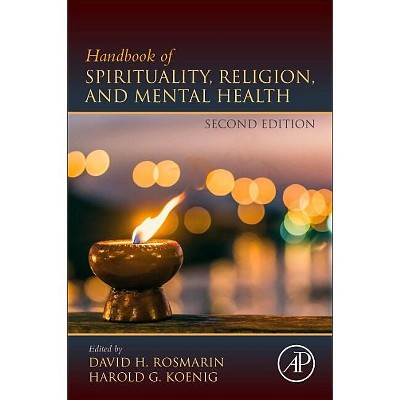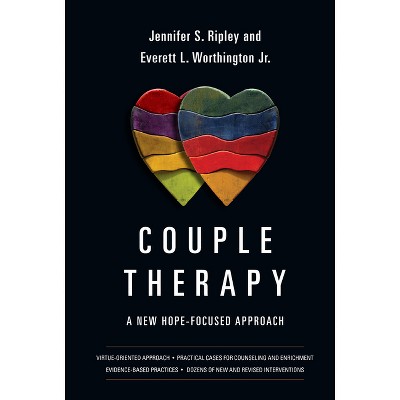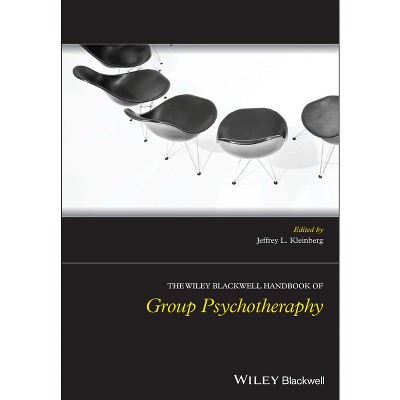Handbook of Positive Psychology, Religion, and Spirituality - by Edward B Davis & Everett L Worthington Jr & Sarah A Schnitker (Paperback)

About this item
Highlights
- This handbook aims to bridge the gap between the fields of positive psychology and the psychology of religion and spirituality.
- About the Author: Edward B. Davis, Professor of Psychology at Wheaton College (IL), has published over 100 articles and chapters, mostly on the intersections of positive psychology and the psychology of religion and spirituality.
- 513 Pages
- Psychology, Psychotherapy
Description
Book Synopsis
This handbook aims to bridge the gap between the fields of positive psychology and the psychology of religion and spirituality. It is the authoritative guide to the intersections among religion, spirituality, and positive psychology and includes the following sections: (1) historical and theoretical considerations, (2) methodological considerations, (3) cultural considerations, (4) developmental considerations, (5) empirical research on happiness and well-being in relation to religion and spirituality, (6) empirical research on character strengths and virtues in relation to religion and spirituality, (7) clinical and applied considerations, and (8) field unification and advancement. Leading positive psychologists and psychologists of religion/spirituality have coauthored the chapters, drawing on expertise from their respective fields. The handbook is useful for social and clinical scientists, practitioners in helping professions, practitioners in religious and spiritual fields, andstudents of psychology and religion/spirituality.
This is an open access book.
From the Back Cover
This open access handbook aims to bridge the gap between the fields of positive psychology and the psychology of religion and spirituality. It is the authoritative guide to the intersections among religion, spirituality, and positive psychology and includes the following sections: (1) historical and theoretical considerations, (2) methodological considerations, (3) cultural considerations, (4) developmental considerations, (5) empirical research on happiness and well-being in relation to religion and spirituality, (6) empirical research on character strengths and virtues in relation to religion and spirituality, (7) clinical and applied considerations, and (8) field unification and advancement. Leading positive psychologists and psychologists of religion/spirituality have coauthored the chapters, drawing on expertise from their respective fields. The handbook is useful for social and clinical scientists, practitioners in helping professions, practitioners in religious and spiritual fields, and students of psychology and religion/spirituality.- A comprehensive resource examining the intersections of positive psychology and the psychology of religion/spirituality
- Draws connections between two fields that research has increasingly shown to be connected
"This Handbook provides a masterful, comprehensive review of theory, research, and clinical applications at the exciting intersection between the psychology of religion/spirituality and positive psychology. It demonstrates each of those fields is incomplete without the other. This book should be in the shelf of every serious student of religion, spirituality, and psychology."
-Pehr Granqvist, Ph.D., Professor of Psychology, Stockholm University, Author of Attachment in Religion and Spirituality: A Wider View
"Within this volume is found the next frontier of positive psychology, exponentially expanded through spiritual awareness and the translation of spiritual experience into lived positive cognition, behavioral habit, and practice. The editors of this volume help clear a rich new terrain for the next generation of humanitarian practitioners, researchers, and scholars."
-Lisa Miller, Ph.D., Professor of Psychology and Education, Teachers College, Columbia University, Editor of Oxford University Press Handbook of Psychology and Spirituality, Author of The Awakened Brain and The Spiritual Child
"At last! This broad-based, creative, integrative handbook helps fill a niche by focusing directly on the interface between positive psychology and the psychology of religion and spirituality."
-Julie J. Exline, Ph.D., Professor of Psychology, Department of Psychological Sciences, Case Western Reserve University, Co-Author of Working With Spiritual Struggles in Psychotherapy: From Research to Practice
Review Quotes
"We encourage you to approach this book as an intellectual meal to savor slowly and mindfully. ... We encourage you to approach this handbook with that vista of possibility in mind. Search for reasons that might be beneficial for positive psychology to integrate R/S more into its theorizing, empirical research, and practical applications. ... Ultimately, we hope this chapter's suggestions will inform what you "eat" and digest from this book ... ." (, Scriptable, rtreview.org, Vol. 116, November, 2023)
About the Author
Edward B. Davis, Professor of Psychology at Wheaton College (IL), has published over 100 articles and chapters, mostly on the intersections of positive psychology and the psychology of religion and spirituality. He also is a licensed clinical psychologist who practices from a positive psychology framework that often is spiritually integrative. Davis has procured more than $4 million in funding as a principal investigator on research grants and was the recipient of the 2020 Early Career Award from the American Psychological Association's Division 36 (Society for the Psychology of Religion and Spirituality).
Everett L. Worthington, Jr., Commonwealth Professor Emeritus, has published over 500 articles and chapters and over 45 books on positive psychology, religion/spirituality, and the hope-focused couple approach. He does an essentially equal amount of basic scientific and applied research. He has co-edited several Springer-published handbooks.
Sarah A. Schnitker, Associate Professor of Psychology and Neuroscience at Baylor University, studies virtue and character development in adolescents and emerging adults, with a focus on the role of spirituality/religion and technology in virtue formation. Schnitker has procured more than $6 million in funding as a principal investigator on multiple research grants and has published over 50 articles and chapters.
Shipping details
Return details
Trending Diet, Health & Fitness Books



